EDA Experimental Digital Arts, room 1250
Broad Art Center
University of California, Los Angeles
April 28, 12pm
more information on the UCLA Art|Sci Centre
[ add comment ] ( 27 views )
Carmen Hutting and Annet Dekker interviewed me recently, published in the Tag Mag 5, produced by <>Tag in Den Haag. You can now read it in the side bar of this blog or online at the NIMk website:
http://www.nimk.nl/en
[ 1 comment ] ( 26 views )
The Test_Lab: Topology stream is now online > find the Satellite Sounders presentation at 49:00
http://live.v2.nl/v2/2008/testlab/080417-topology.qtl
[ add comment ] ( 23 views )
I'll be presenting the Satellite Sounders as part of the Test_Lab Topology evening at V2_Insitute for the Unstable Media in Rotterdam. The evening starts at 20:00 and includes a number of presentations around theme of topology.
"This topology edition of Test_Lab will feature several new and exciting (aRt&D) projects within the artistic topology tradition and will investigate the common understanding of the notion of topology in the arts. Test_Lab: Topology will reveal censored areas on Google maps and the true networks of the world's power structures, and will include a sonic navigation walk and a fashionable artist intervention."
It will be streamed live on live.v2.nl
[ add comment ] ( 24 views )
The evening begins at 20:30hrs, NIMk, Keizersgracht 264, Amsterdam
Presentations by: Yolande Harris, David Dunn and Atau Tanaka
"What does it mean to navigate? What is the importance of location specificity? What does it mean to get lost? The increasing accuracy of satellite navigation strives to eliminate the possibility of human error, but it also produces a sense of dislocation from one's immediate environment by abstracting location as the coordinates of longitude and latitude. What place is there for one's body, one's senses, one's conscious and unconscious awareness of space, if this knowledge is so apparently made redundant by GPS? What, if any, role can historical skills of navigation at sea, of observation, choice, intuition and improvisation play in navigating the spaces of the future?
The symposium 'Navigating the Space of the Future' will take these questions as its starting point to see if we can find our way within the dense environment of global positioning technologies. The field is open but the practice is just starting to form itself by looking at ways to counter locative media strategies where geographical walks are organised that use the city and the street as a playing field negating the relation between space, architecture, time, body and mind. The presentations will focus on new ways of interpreting data of location and navigation by relating these directly to the physical (space) through the use of sound. "
more information and reservations on NIMk
[ 2 comments ] ( 35 views )
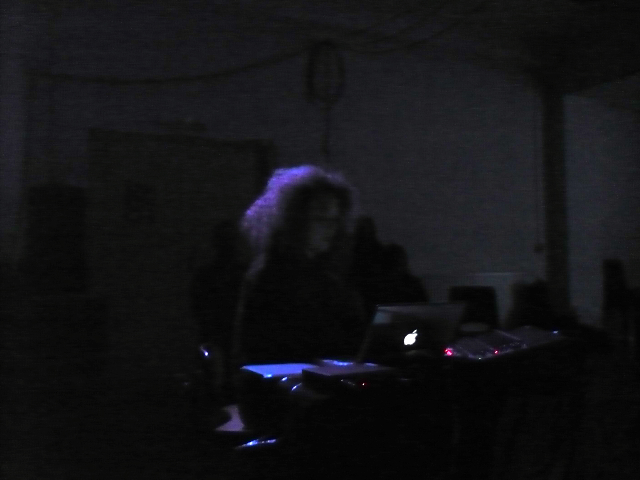
[ add comment ] ( 25 views )
Sun Running performance at STEIM Wednesday 2 April 20:30
"Physicality in electronic music has always been one of the central themes at STEIM, but not every musician takes a gestural or bodily approach to performing their music. Physicality of the sound, the space and the location are equally important, especially for laptop musicians and sound artists.
For our next concert we have invited three typically "non-gestural" artists to work in our studios and prepare for this performance. We wanted to create a critical platform for laptop musicians as well where new forms of presentation and performances can be explored. For each of these invited artists, their instrument extends beyond the actual device that they are touching by incorporating the speaker, field recordings and navigational data as essential elements of the performance. We hope to see you at our next event to witness these extended techniques in live laptop music."
[ add comment ] ( 25 views )
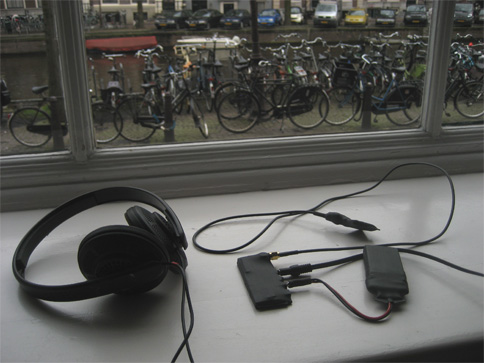
a Satellite Sounder !
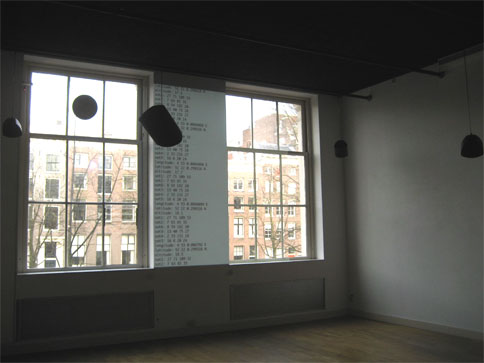
Dead Reckoning sound and video installation using live GPS data.
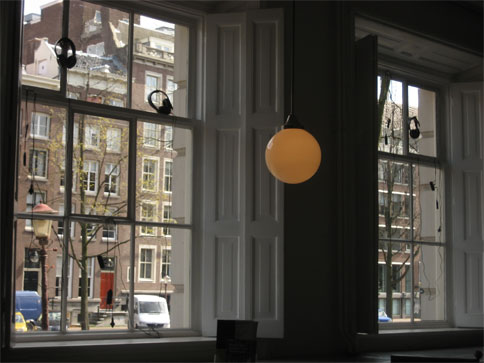
Satellite Sounders hanging in the windows for visitors to take outside.
[ add comment ] ( 28 views )
"Similarly, when summer and winter separate so that either summer recedes and winter arrives or winter recedes and summer arrives, than a certain mixed substance appears, flying in the air, like a whiteness of threads, where the air is purifying itself. This descends to the earth owing to the collision of summer and winter, that is, when the two seasons come into conflict with each other."
Hildegard of Bingen (1098 - 1179) from Causes and Cures
[ add comment ] ( 23 views )
An image of my video and sound installation as part of the group exhibition on Eco-Aesthetics curated by Hicham Khalidi and Tiffany Holmes. The exhibition opened last Saturday 22 march and runs until 28 April and gives a very interesting perspective on art and environmental issues without being didactic or heavy ... well done <>TAG!
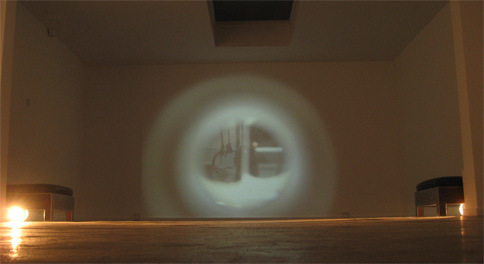
[ add comment ] ( 61 views )
I based my talk at Mediamatic (20 march) on this idea:
The experience of sound is internal, as a process that influences the relationship between the self and the environment. True navigation consists of a continuously coherent relationship between the two.
I read excerpts from books that represent a series of correspondences between my ideas in Sun Run Sun and those of other writers, thinkers composers. They re-enforced five points:
1. static position is derived from movement
Brian Massumi, Parables for the Virtual, Movement Affect, Sensation (Duke University Press 2002)
Chapter 8 is called Strange Horizon and deals with navigation and body topologies (p180)
2. Where am I? Correspondence between place and map, the surroundings and its representation.
Edwin Hutchins Cognition in the Wild (MIT Press 1995)
presents research in cognitive science using navigation on a naval vessel as the primary investigation. Also a large section on Micronesian navigation techniques in contrast to Western techniques.
3. sounds in water, air and solids; the ear in orientation and balance
David Dunn Why do Whales and Children Sing? (Earth Ear 1999) I played the excerpt on underwater sounds. (p33)
4. towards amphibians, swimming, floating, frogs
Umberto Eco The Island of the Day Before (Minerva 1995)
the main character is discovering how to swim from the boat to the shore, and attempts to copy the movements and sounds of a frog... (p361)
5. a planetary, orbiting perspective
R. Buckminster Fuller Intuition (Anchor Press 1973)
this amazing book was written on the eve of the launch of his yacht which he named Intuition. I read a section about moving in and out, rather than up (stairs) and down (stairs), with respect to the earth. (p106-112)
"...we are indeed riding
Within the thin gaseous skin of a planet."
[ add comment ] ( 50 views )
I'm presenting the ideas around the project at Mediamatic in Amsterdam as part of the Eco-Aesthetics exhibition and events organised by <>TAG.
Here's the program for the evening:program
"How can artists translate everyday information visually or sonically? What are innovative artists and designers doing to promote conservation of resources using innovative technology and creative thinking? How can art make us more aware of the kilowatts we consume or the carbon we emit? Can artists significantly inspire observers to be more environmentally sensitive by giving information a particular form or sound? Furthermore, can art increase our ability to analyze and relate spiritually and emotionally to the natural world we live in?"
19:00 entrance
19:15 - 19:20 introduction by Hicham Khalidi
19:25 - 19:45 lecture Tiffany Holmes
19:50 - 20:10 lecture Beatriz da Costa
20:15 - 20:35 concert
20:35 - 20:55 pause
20:55 - 21:15 lecture Michael Mandiberg
21:20 - 21:40 lecture Yolande Harris
21:45 - 22:05 lecture Esther Polak
[ add comment ] ( 90 views )
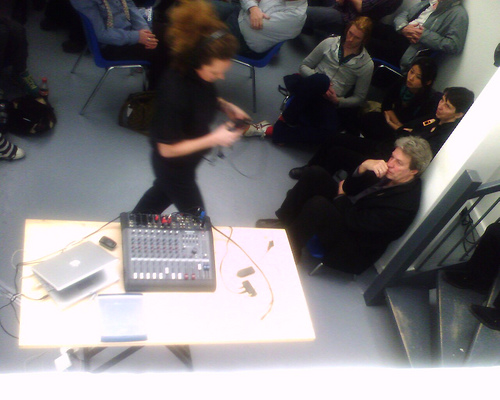
There was a fantastic turn out at <>TAG for the performance, so many people that they didn't actually fit - sorry to anyone who couldn't see or be within the 'aquarium' of speakers where the sound was best.
I used 2 of the Satellite Sounders (you can see one lying on the table, I'm bringing the other one in from outside) and managed to keep the live GPS signal during the performance, both sounders were mapped to different sounds.
I'm still waiting for the official photos, I found this on flicker taken by one of the audience - thanks! they note that the dutch minister of culture is sitting in the corner on the right...
thanks to Keir, Hicham and others from <>TAG for making this such a fun event!
[ add comment ] ( 25 views )
The motherboard carrying the processor is the smallest 'gum'-sized board on top of the slightly larger expansion board which carries the GPS receiver, audio. and connectors. To upload files we had to use the serial connection (USB didn't work with this combination of boards, and there were other problems with bluetooth), Jorgen made a beautiful hidden connector that sits between the two boards. The whole thing is secured tightly by waxed string. The next stage was covering in rubber shrink-wrap - material that shrinks when heated to protect electronics, which gives the final form of the satellite sounders.
[ add comment ] ( 22 views )
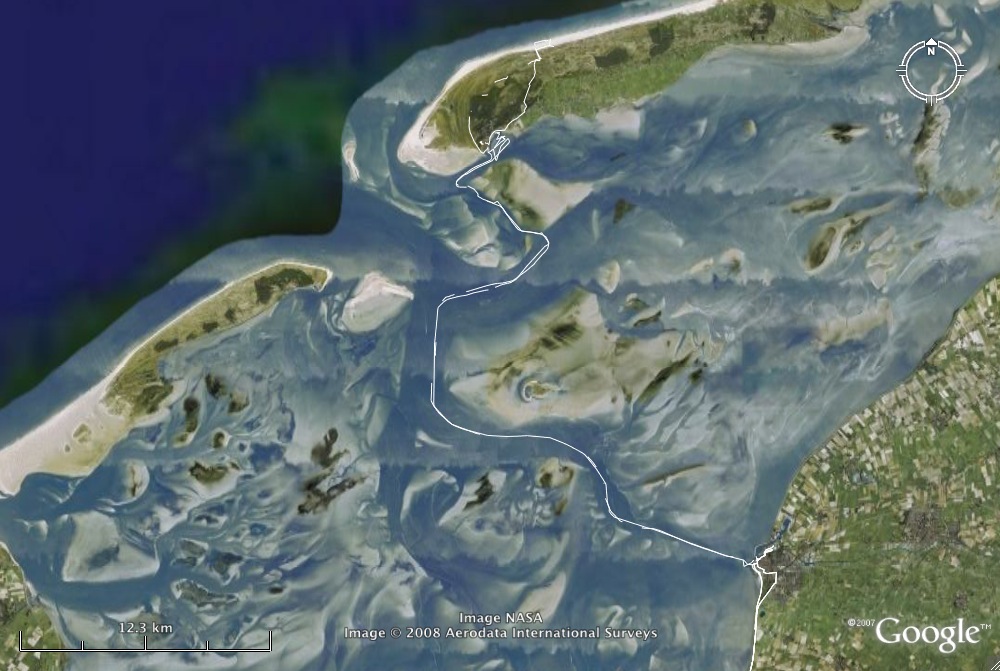
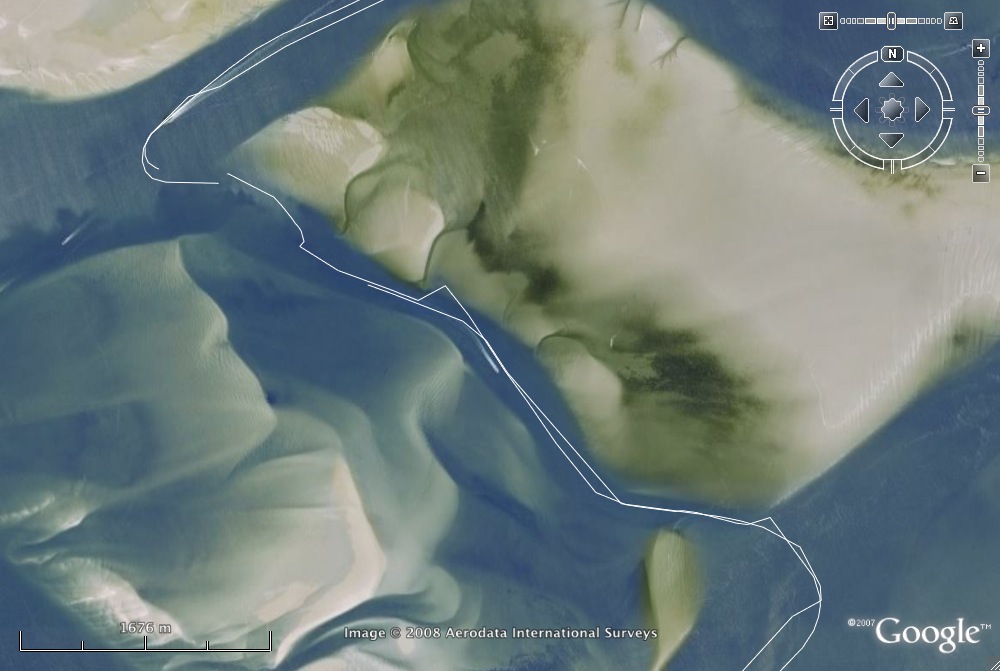
[ add comment ] ( 20 views )
date: Saturday 15 March
time: 16:30
entry: 5 euros
location: <>TAG Den Haag
part of Dag in de Branding edition 07
Imagine a coastline, a land of rising and falling water levels, an inevitably increasing wetness in some areas and dryness in others. Imagine yourself sometimes hovering and sometimes submerged in a sonic sea that meshes navigational data and marshland amphibians…
Sun Run Sun charts a path between environmental engagement and technological development, using sound as the medium to enhance both. Signals from satellites in orbit, together with the performer’s coordinates on earth, generate live music in real time.
“I use sound because it is not an object, not something to hold or touch, not external to myself,” states Harris. “The experience of sound is internal, as a process that influences the relationship between the self and the environment. True navigation consists of a continuously coherent relationship between the two.”
During her thirty-minute performance, Yolande will slowly reveal the patterns of orbiting satellites coming in and out of range and inconsistencies in how GPS technology locates the self in a longitude/latitude grid. Harris’s soundscape, in both the performance and the installation, questions what is inside and what is outside, what it means to be located and what it means to be lost.
Sun Run Sun delicately treads a path between technical data and actual experience, between the artificial and natural. It joins the disparate sonic worlds of electronic satellite signals and the songs of marshland amphibians. This hybrid form of knowing, techno-intuition, unites scientific and innate systems of environmental awareness.
Amphibian is a futuristic vision / audition into a world on the transitional spaces between water and land, the deltas and coastlines that continuously shift, and that are threatening to shift dramatically in coming years. Our blind faith in the technologies of navigation systems morphs into a techno-intuition of an amphibious engagement with our environment. The sounds of orbiting satellites in Sun Run Sun reveal not only our location on a grid, but our relationship to the sky, asking us to re-assess and re-negotiate our connection with the environment.
[ add comment ] ( 20 views )
15/3 Amphibian
performance during Dag in de Branding Festival at <TAG> Gallery in Den Haag
20/3 lecture Eco-Aesthetics at Mediamatic Amsterdam
22/3 - 28/4 Navigating by Circles
video and sound installation in the Eco-Visualisation exhibition curated by Tiffany Holmes and Hicham Khalidi at <TAG> Gallery in Den Haag
28/3 - 10/5 Satelllite Sounders and Dead Reckoning
sonic walk and sound installation in the Territorial Phantom exhibition at Netherlands Institute for Media Arts (montevideo) in Amsterdam.
2/4 Sun Run Sun
performance at STEIM in Amsterdam
[ 1 comment ] ( 50 views )
Sukandar has thoroughly documented the technical details of making the satellite sounders, mostly relating to the Gumstix development: http://sungum.pbwiki.com
[ add comment ] ( 20 views )
the second prototype showing the wrapped gumstix and GPS antenna, without battery and headphones, gives an idea of the modular form of the final sounder
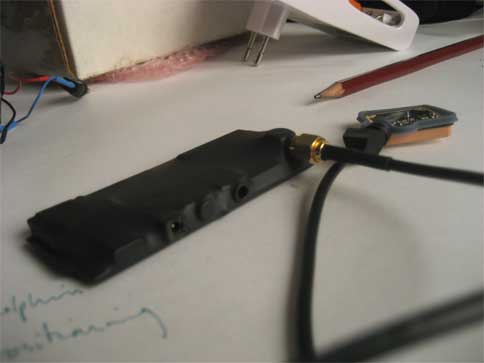
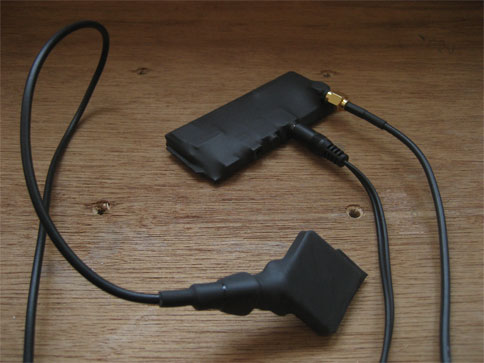
[ 1 comment ] ( 29 views )
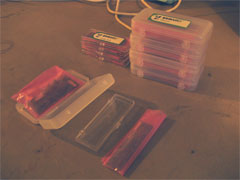
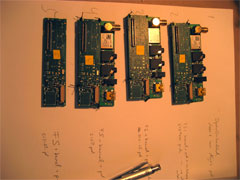
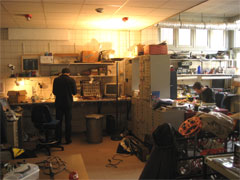
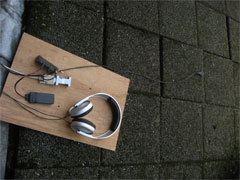
[ add comment ] ( 20 views )
listen to these on headphones at a low volume!!!
[ add comment ] ( 20 views )
this week and next week working on the hardware at STEIM, with Jorgen - batteries, antenna, casing, placement of final modules - and Sukandar whose working with the 5 new sets of Gumstix getting Linux running and installing PDa to run the sound patches I've been working on. testing outside soon i hope...
[ 1 comment ] ( 42 views )
by "mapping" i refer to decisions of how to transform data into sound
this is a relatively simple example:
GPS data is limited in its ranges and frequency of change
the sound is limited by the computing power of the small device
i need identify the prominent characteristics of movement and change in the data and map this to suitable changes in audio. but to do this I need to have an idea of the density of the soundfield I will make, how perceivable changes in data will be, how the characteristics of movement will be traceable in the final sound.
the data has specific numerical ranges and limits. the sound is only limited by human hearing range and distortion of the audio signal. so choices have to be made at the specific level of numerical transformations into audio processes and the final audible result will be particular to those choices.
the sonification of data implies an obligation to choose sounds, and engage in the sonic as composition and as a field of emotive potential to the listener, basically pure sound overlayed or underlayed with patterns of meaning that may or may not be apparent in the audible experience.
[ 1 comment ] ( 39 views )
GSV satellite data describes the changing envelope and stereo placement of the electronic sounds, combined with the frogs (from David Dunn's "Why do Whales and Children Sing")
Here the GSV data is different because other satellites are being tracked. I'm experimenting with different ways of sonifying the RMC (long/lat) data and altitude, here the noise in the background is filtered according to the changes.
[ 1 comment ] ( 32 views )
David Dunn's excellent recent article "Acoustic Ecology and the Experimental Music Tradition"
http://www.newmusicbox.org/article.nmbx?id=5399
[ add comment ] ( 22 views )
Amphibian is a futuristic vision / audition into a world on the transitional spaces between water and land, the deltas and coastlines that will shift in constitution over the coming years. Our blind guidance of technologies of navigation systems starts to morph into a techno-intuition of amphibious involvement with environment. Listening to the orbiting satellites we can hear more than our location on a grid, asking us to re-assess and re-negotiate our relation with the environment.
imagine:
satellites,
between land based and in air
to on and under water
now think of coastlines and deltas
and the shifting water line
the altitude trace above and below water-level
the wetness of the sound and the dryness of the sound
now imagine the sound of amphibians
the frogs
towards an amphibious state
of techno-intuition
coastlines are the area of change
if sea-level rises
we are moving underwater
this is dormant in the consciousness
(as is noah's ark)
so the sound will become wetter
(and we will become amphibian)
we run on this line of rising water
blue underwater in air
whale amphibian
sound water
liquid air waves
locating my beach in the sky
cloud surfing
under liquid form unity of substance
float between states
states at edge make a
breaking wave
thunder from location data
[ add comment ] ( 26 views )
these prototype sounds will be developed for the final version; but even now it's easy to hear the movements of the two kinds of data, the satellites themselves (cricketing) and the long/lat position (frogging)
[ add comment ] ( 21 views )
Last week I collected the prototype of the GPS/sound instrument from Sukandar's studio in Berlin. These photos show the bare boards receiving the GPS data and converting it to sounds using PDa. It's tiny! The plan now is to build these elements into an integrated instrument.
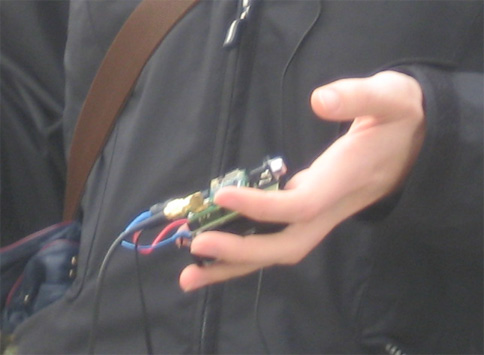
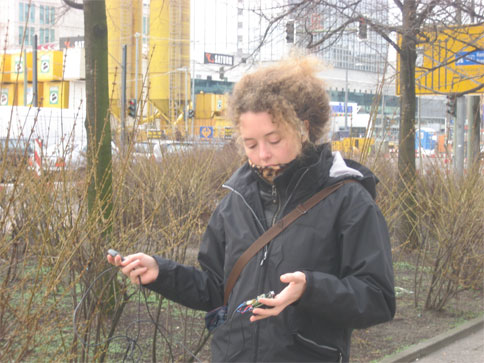
[ add comment ] ( 452 views )
read damian's report
"I was brought on board this project to help out with Pure Data patch development. Specifically, I was to:
- write a parser for NMEA data in Pd;
- help Yolande translate existing Max/MSP patches to Pd;
- figure out how to connect the NMEA parser to the sound patches (networking protocol);
- ensure sound works on the PDa version of Pd."
[ add comment ] ( 20 views )
Working on the GPS data (NMEA), receiving, sorting, mapping to sounds and movements in space. With Damian at NIMK. Main issues: GPS parser, to read in the stream of data and make it useful for sound production.
I'm interested in the info of the satellites themselves, the PRN number, elevation, azimuth and signal/noise ratio (often called signal strength). This comes in the GPGSV sentence of the data, there seem to be up to 32 satellites possible but only a maximum of 12 will be seen at any one time. We were getting between 5 and 10 in the artlab on the top floor in NIMK. It's clear to see the changes over time as the satellites move. I imagine each satellite with their own unique sound which is transformed over time by the three parameters (elevation, azimuth, SNR). Damian made a patch that reads all the data but selects the four satellites with best signal, so that when one moves out of range and dissappears it's replaced by another.
The second layer is the location data, or minimum navigation data called GPRMC, which gives longitude, latitude, time, date, speed, track degrees true etc. This is the typical layer used for navigation and is calculated from the satellite positions. It refers to where the player is, not where the satellites are. I want to use this as a different layer of sound in the piece. We talked about ideas of scaling this data for different speeds over the ground, walking, cycling, driving, flying etc - how to keep a sonic identity of a specific place if the data is scaled according to speed. It might be that Brussels ends up sounding like Amsterdam if going fast, but not if walking, which is a nonsense... Is the scaling necessary then? I have to try with the sound, I think it's probably a sonic issue.
Spatialising this sound according the position of the satellites, or the movement of the player. Does this map directly to the real world direction, in which case we need to use a compass, or does this relate to the body of the person? This is different in the portable version and the static installation version.
[ add comment ] ( 23 views )

 Archives
Archives




